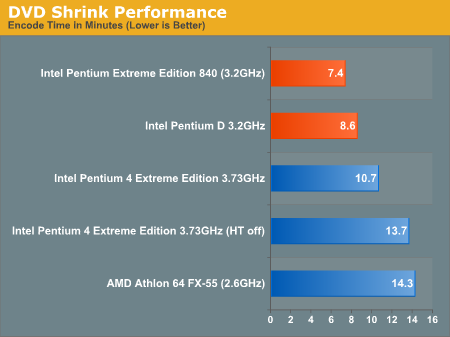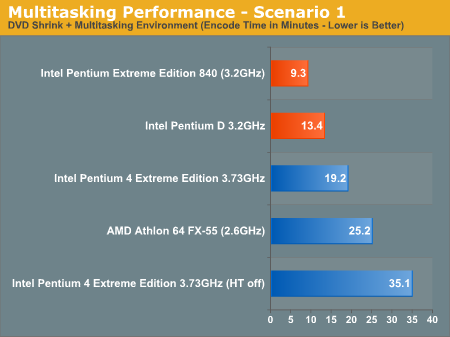Intel Dual Core Performance Preview Part I: First Encounter
by Anand Lal Shimpi on April 4, 2005 2:44 PM EST- Posted in
- CPUs
Multitasking Scenario 1: DVD Shrink
If you've ever tried to backup a DVD, you know that the process can take a long time. Just ripping the disc to your hard drive will eat up a good 20 minutes, and then there's the encoding. The encoding can easily take between 20 - 45 minutes depending on the speed of your CPU, and once you start doing other tasks in the background, you can expect those times to grow even longer.
For this test, we used DVD Shrink, one of the simplest applications available to compress and re-encode a DVD to fit on a single 4.5GB disc. We ran DVD Decrypt on the Star Wars Episode VI DVD so that we had a local copy of the DVD on our test bed hard drive (in a future version of the test, we may try to include DVD Decrypt performance in our benchmark as well). All of the DVD Shrink settings were left at default, including telling the program to assume a low priority, a setting many users check in order to be able to do other things while DVD Shrink is working.
As a single application with no multitasking involved, here's how DVD Shrink performs:

As you can see, the new dual core chips can shrink a DVD in about 70% of the time of the 3.73EE. But what happens to performance when you start doing other things in the background?
In order to find out, we did the following:
1) Open Firefox and load the following web pages in tabs (we used local copies of all of the web pages):
We kept the browser on the AT front page.
2) Open iTunes and start playing the latest album of avid AnandTech reader 50 Cent on repeat all.
3) Open Newsleecher.
4) Open DVD Shrink.
5) Login to our news server and start downloading headers for our subscribed news groups.
6) Start backup of Star Wars Episode VI - Return of the Jedi. All default settings, including low priority.
DVD Shrink was the application in focus; this matters because by default, Windows gives special scheduling priority to the application currently in the foreground (we will test what happens when it's not in the foreground later in this article). We waited until the DVD Shrink operation was complete and recorded its completion time. Below are the results:

Now, we start to see where dual core helps. In this relatively simple multitasking scenario, the DVD shrink task took more than twice as long on single core CPUs than it did on dual core chips. The Pentium 4 without Hyper Threading took a full 35 minutes to complete the task, compared to the 9.3 minutes of the dual core Pentium Extreme Edition. Even the fastest from AMD couldn't hold a candle to the dual core offerings.
And this was only with a minimal amount of multitasking. Had more applications been running or had actual user interaction taken place during the test, the dual vs. single core gap would've grown even more.










141 Comments
View All Comments
Pandaren - Tuesday, April 5, 2005 - link
Drat. Double Post. Where's the gaming benchmarks? And are those multitasking scenarios realistic? I don't think I would ever do all that at once.Pandaren - Tuesday, April 5, 2005 - link
sideshow23bob - Monday, April 4, 2005 - link
Additionally, what about throwing in Nero,DC++, azureus, bitcomet, and/or Power DVD. Just progs. that alot of typical college-aged users use(i can verify at least). Great article. Loved the multitasking analysis especially.sideshow23bob - Monday, April 4, 2005 - link
ravedave - Monday, April 4, 2005 - link
Anand, what about DVDDecrypt and DVDShrink at the same time (as in decrypting one movie, shrinking another)? Dual core could really make ripping faster if you could do both of those at once...ViRGE - Monday, April 4, 2005 - link
#44, SETI is a really good idea, not just because of heat but because it'll push the memory/FSB at the same time. If Intel's chips are getting choked, SETI should scream pretty loudly by tanking in performance.nigham - Monday, April 4, 2005 - link
Thanks, this was a real nice review and its got me all excited. One thing I'd really like to know, though, how does Linux handle dual-core? Does it show the same kind of multi-tasking performance boost that we see on Windows XP? I mostly use Linux for my work and I do a ton of multitasking. Windows I use only for gaming, which as you point out are mostly single threaded applications.gregwjones - Monday, April 4, 2005 - link
Dual-core benchmarks I'd like to see:Two instances of Seti@Home, BOINC version, run on a Pentium D 3.2GHz( dual-core, but no HT )
compared to Pentium 4 3.2GHz single core with HT.
Then run four instances of SETI@Home on the Pentium EE ( dual-core with HT ).
This should generate a lot of heat and put everything at max load.
I have a Pentium 4 Northwood with HT enabled and run two instances of BOINC Seti@Home while using the system to do everyday tasks.Like web browsing, DVD Decrypt, DVD Shrink. Everything is very responsive because BOINC runs at a very low priority.
dragonballgtz - Monday, April 4, 2005 - link
Great article! It's a good thing you did not do a review like all of the other sites. With just some benchmarks and a few games.As always I can't wait to read more reviews form you Anand. :thumbsup;
shabby - Monday, April 4, 2005 - link
The multi-tasking numbers are definetly intresting, but any sane person will wait and see what amd has up its sleeve.